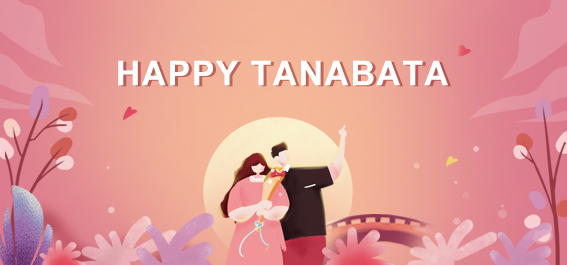
In China’s time (15 hours ahead), today is Qixi Festival 七夕节. This originates from a love story between the cowherd and the weaver girl in the Chinese mythology. Their love was not allowed and thus they were banished to opposite sides of the Milky Way. Once every year, on the 7th day of the 7th lunar month, they met each other on a bridge formed by a flock of magpies.
The Qixi Festival (other names: Qiqiao Festival, Qiqiao Festival, Seven Sister’s Birthday, Moral La, English name: Double Seventh Festival) is endowed with the beautiful love legend of "Cowherd and Weaver Girl", making it a festival that symbolizes love, and is therefore considered to be The most romantic traditional festival in China, the date is July 7th of the lunar calendar every year.
On the Qixi Festival, folks have customs such as worshiping the moon and praying for blessing, worshipping the Weaver Girl, eating fruit, and begging for marriage.
Japan
Japan’s "Tanabata Festival" originated from China and was reportedly introduced during the Nara period. Beginning in the middle of the Nara period, the Japanese court and the upper class imitated the Tang Palace, and the Qixi Festival, piercing needles and begging for cleverness and Qixi poems became popular. [28] Continued the customs and habits of "begging for cleverness", but it has nothing to do with love. The Tanabata Festival was originally the seventh day of the seventh month of the lunar calendar. After the Meiji Restoration, Japan abolished the lunar calendar. Therefore, the Tanabata Festival in Japan is July 7th each year.
Japanese Tanabata Festival is not mainly used to pray for love, but to pray for girls to have a good craft. At this time of the year, adults and children will gather together to write wishes and poems on colorful strips of poems, and hang them together with paper decorations on the small bamboo in their courtyard. This custom began in the Edo period. In the days approaching the Qixi Festival, there will be Tanabata bamboo trees in many places, and Tanabata wishing trees will be set up in shops selling summer clothes and where supermarkets pay. In some large-scale celebration ceremonies, there will also be a bamboo decoration contest (evolved from the short wishing sign). Local kindergartens, elementary schools and other school organizations or companies will create their own bamboo decorations, compare them, and select the best Few features are displayed.
In addition, the annual "Tanabata Festival" is held every summer in various parts of Japan. People wear traditional costumes, singing and dancing, and taiko drums. The streets and alleys of the "short book" are crowded with adults and children watching and playing. In conjunction with the "Tanabata Festival", there is also the annual summer fireworks display.
Korean Peninsula
Korean writer Choi Namsun recorded in "Korean Common Sense" that Tanabata was originally a Chinese custom and was later spread to South Korea. King Gongmin (the 31st king of Goryeo) and the Mongolian queen worshiped Altair (Cowboy) and Vega together, and Give the salary to the officials on that day.
The most representative custom of Korean Tanabata is to pray for the Vega star, hoping to have the same dexterous hands as the Weaver Girl and weave better. That morning, the women put melons, cucumbers and other fruits on the table and kowtowed, so that the women's weaving skills would get better and better. Another important issue of Korean Tanabata is sacrifices, which can be divided into family sacrifices and collective sacrifices. Korean women want to put clean water on the altar, and the Cowherd and the Weaver Girl are no longer the objects of sacrifice. They mainly pray for the safety of relatives and friends. In some places, field festivals to pray for a good harvest are held.
South Korea’s Tanabata diet is also exquisite. Traditional foods include noodles, wheat pancakes, and steamed cakes.
Vietnam
In Vietnam, the main part of the celebration of Qixi Festival is Chinese, and Qixi Festival has a nickname-"Niu Bull Niu Po Day". On this day, people will go to the temple to make a wish. [28] The tributes used by the Chinese in Ho Chi Minh City to worship the Qixi Festival are mainly customs in southern China, mainly: water chestnut, chess piece cake, money cake, peanuts, etc., as well as "he seedlings" and a "seven sister plate". A tribute closely related to the "Cowherd and Weaver Girl" legend. The young people who participated in the event also wrote down their expectations for love on a note, and made a wish during the worship, hoping that they would have a happy family in the future.